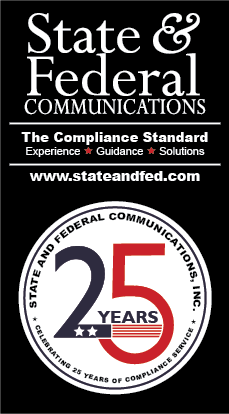 |
 |
E-News from State and Federal
Communications, Inc.
SEPTEMBER
2018
Women Who
Persisted
Before It Was
in our Everyday Lingo
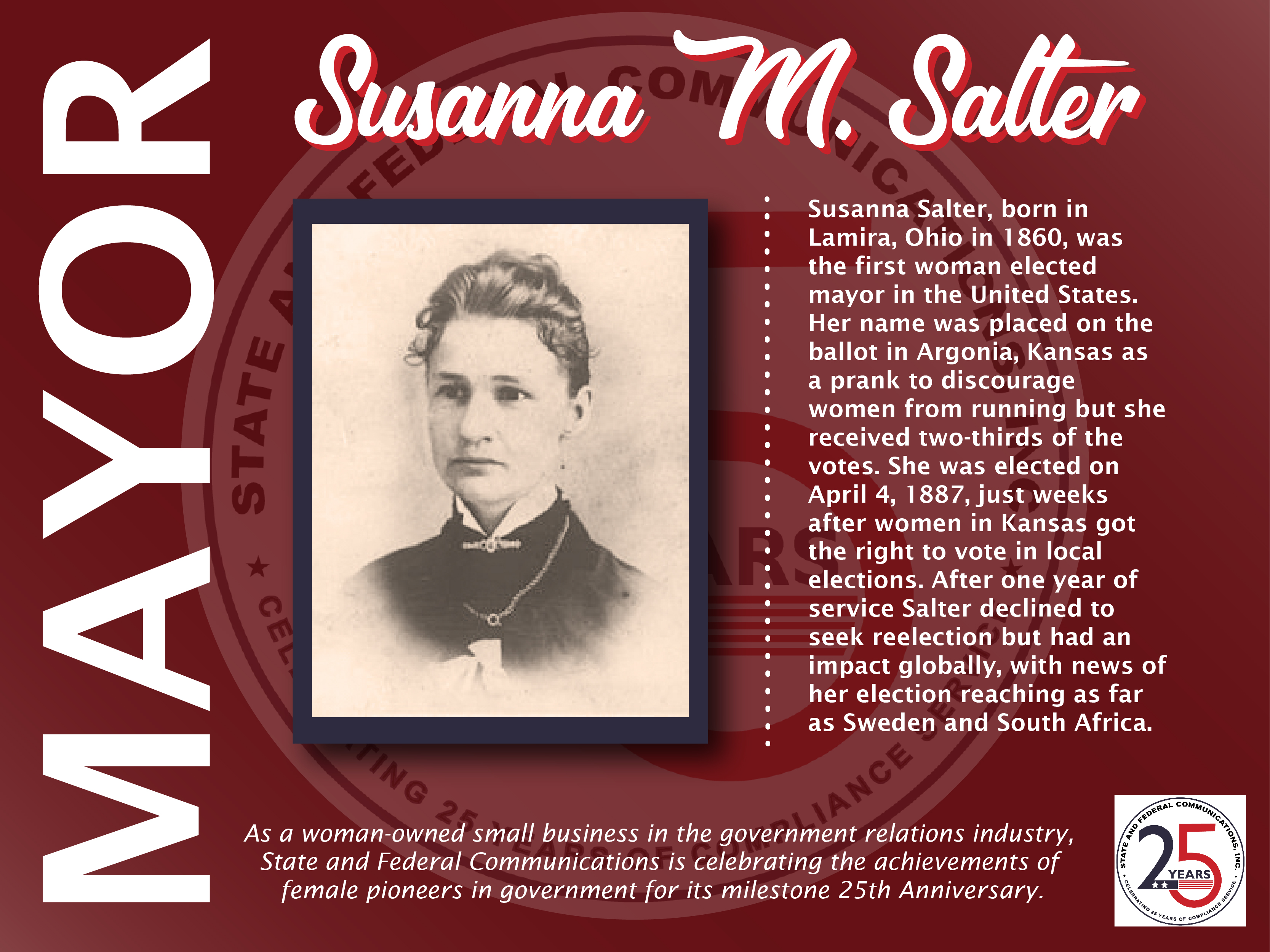
|
|
It is true: I am a woman-owned business. I admire
women who take the step to dare to be different and
make a difference. There have been many first women
in this country.
For the next six months, we are going to introduce
you to many firsts. The women we are featuring were
elected; they were not appointed because their
spouses died. Each of these women ran and won. You
can say they persisted.
In 2018, there are a lot of women running for
election…And, they should be supported because I
believe many of them—maybe not all of them—deserve
to win and we need them. I write a column on
LinkedIn called Another One Bites the Dust
and the lion’s share of them are about men who have
abused the power given to them as an elected
official.
This month we are featuring
Susanna Salter, who was born in OHIO,
which makes her extra special. She was the first
elected female mayor of Argonia, Kansas at the age
of 27. She earned $1 for her service…yes, correct -
one dollar! She served one term and did not run for
re-election.
I am the mother of a successful daughter whom I
believe should run for office. (Public enough for
you, Nicole?) I am not a man-basher…We have had a
number of college interns at State and Federal
Communications—men and women—who should consider
running for office and I suggest they start with a
club at school. Start with student government. Start
with your fraternity or sorority. Put yourselves out
there.
As we celebrate the 25th anniversary of State and
Federal Communications, we will recognize and
celebrate the achievements of female pioneers. I
hope you find these of interest.
Elizabeth Z. Bartz
President and CEO
@elizabethbartz |

New York Placement Agent Ban Signed
into Law
Adrienne Borgstahl, Esq.
Research Associate
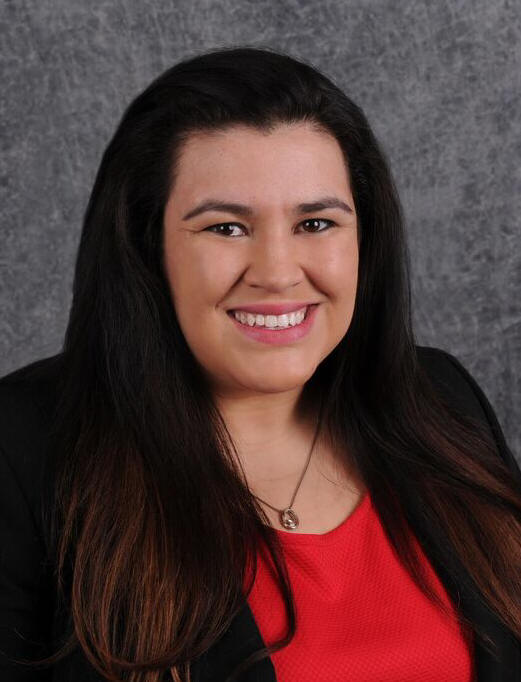
On
August 21, Gov. Andrew Cuomo signed a bill codifying an existing policy of
the Office of the State Comptroller prohibiting the use of placement agents
or intermediaries by investment managers engaging the New York State Common
Retirement Fund. Effective immediately, Assembly Bill 3137 defines
placement agent or intermediary as any person or entity, including
registered lobbyists, directly or indirectly engaged and compensated by an
investment manager to assist the investment manager in obtaining investments
by the Fund whether compensated on a flat fee, a contingent fee, or any
other basis. Employees of an investment manager and its affiliates are
excluded from this definition unless employed principally for the purpose of
securing or influencing the decision to secure a particular investment
transaction or investment by the Fund. An investment manager must certify
the investment manager has not used the services of placement agents,
registered lobbyists, or other intermediaries.
In
2009, New York State Comptroller Thomas DiNapoli implemented the policy
following a pay-to-play scandal involving former State Comptroller Alan
Hevesi. An investigation by then-Attorney General Cuomo revealed members of
Hevesi’s family and friends inappropriately benefited from financial firms
interested in assisting the public employee retirement fund to obtain
investments. For those crimes, Hevesi was sentenced to one to four years in
prison. Hevesi’s conviction contributed to nationwide reforms banning
placement agents and political contributions, including those adopted by the
Securities and Exchange Commission.
DiNapoli continually pushed for the policy to become state law by
introducing it as legislation during every session since 2011. The New York
State Teachers’ Retirement Fund also has a policy restricting certain
contacts with placement agents, but the restriction is not included in
Assembly Bill 3137.
[The details for this article have been updated on our website in the
Registration section of the Procurement Lobbying Compliance Laws for New
York]. |
 Summary of Changes UPDATE Summary of Changes UPDATE
Note Recent Changes to
Compliance Regulations
Michael Beckett, Esq., Research
Manager
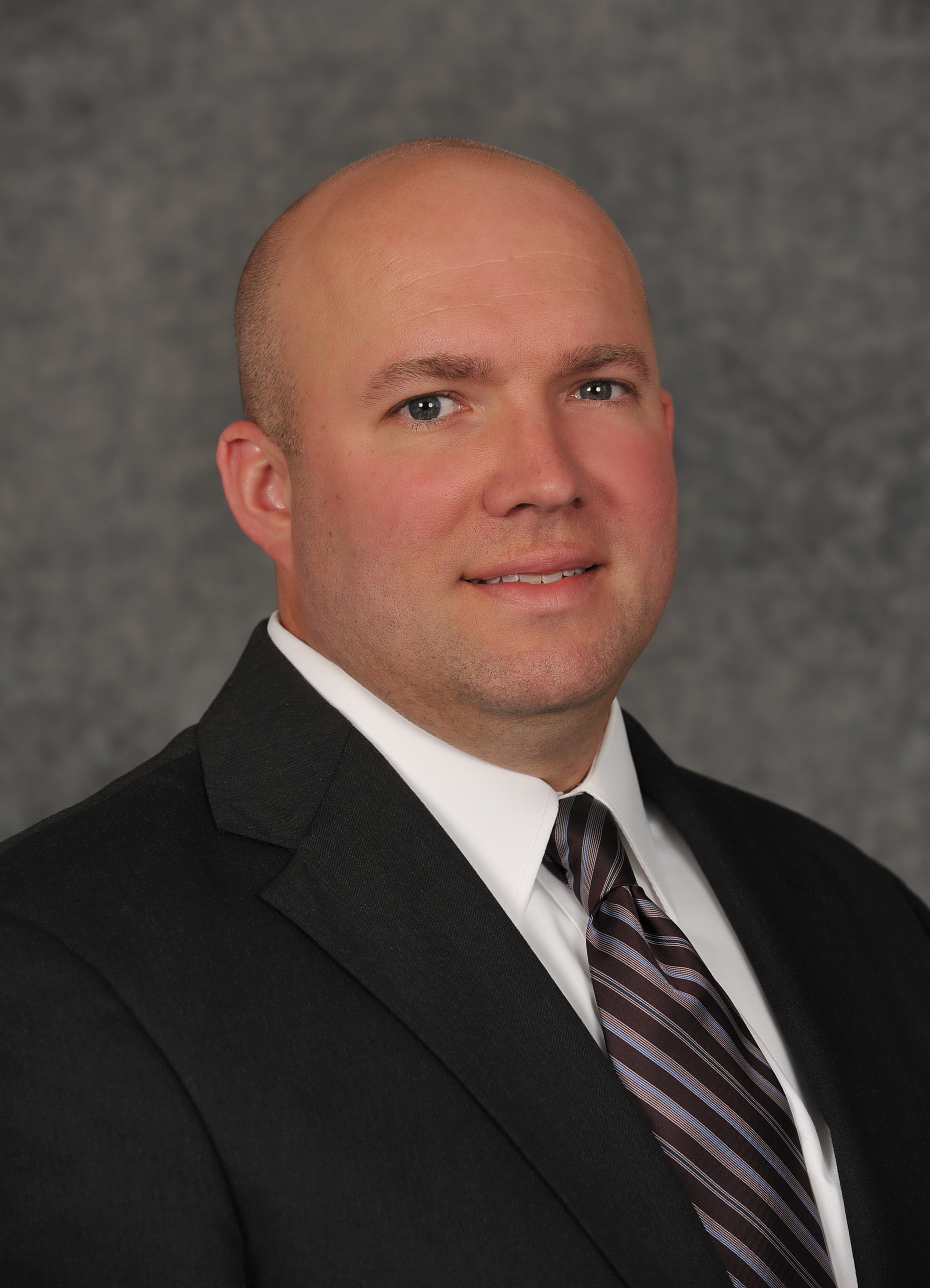
CALIFORNIA:
The Fair Political Practices Commission is considering changes to
state campaign finance regulations. The commission was asked to
consider the permissible use of cryptocurrency, such as Bitcoin, for
campaign contributions and expenditures. Though similar to cash,
such currency is not issued by a governmental entity. Issues
expected to be discussed at a public hearing include banning the use
of cryptocurrency for campaign purposes, limiting cryptocurrency
contributions to the amount of contributions received in cash,
requiring cryptocurrency contributions to be converted to cash,
permitting committees to establish separate cryptocurrency accounts,
or permitting cryptocurrency contributions as in-kind contributions
without regard to cash limits. A public hearing will be held
September 20. Written comments should be received by September 18.
MAINE: Lobbyists will now be
required to complete an in-person harassment training following the
passage of Legislative Document 1842. The training must be taken at
the beginning of every regular session. Additionally, lobbyists must
include the date the training was completed on their lobbyist
registration form.
MASSACHUSETTS: The Office of
Campaign and Political Finance issued an emergency regulation
requiring independent expenditure disclosure prior to the primary
election on September 4. Without the regulation, independent
expenditures made on August 23, 24, and 25 would not have been
disclosed until after the September 4 primary election. The
emergency regulation eliminated the gap by requiring disclosure
within 24 hours if utilized on August 23, 24, or 25.
MONTANA: Attorney James Bopp,
Jr. has asked the U.S. Supreme Court to strike down Montana’s
contribution limits, arguing they are an unconstitutional limit on
free speech. Bopp was an attorney in the well-known Citizens United
case, which led to the U.S. Supreme Court ruling corporations cannot
be prohibited from spending on elections. Montana’s limits were
struck down in 2012 and again in 2015, but the 9th U.S. Circuit
Court of Appeals ruled last October the limits are constitutional.
The U.S. Supreme Court has not yet said if it will take up the case.
NORTH DAKOTA: If the
anti-corruption measure on the November 6 ballot is approved by
voters, a new ethics commission will be responsible for adopting
rules related to elections, lobbying, and for reporting and
investigating alleged violations of those rules and related state
laws. Additionally, the measure prohibits gifts from lobbyists,
prohibits the delivery of campaign contributions by lobbyists, and
creates a revolving door provision banning public officials from
becoming lobbyists for two years after leaving office. |
Legislation We Are
Tracking
At any given time, more than 1,000
legislative bills, which can affect how you do business as a government
affairs professional, are being discussed in federal, state, and local
jurisdictions. These bills are summarized in State and Federal
Communications' digital encyclopedias for lobbying laws, political
contributions, and procurement lobbying and can be found in the client
portion of our website.
Summaries of major bills are also included
in monthly email updates sent to all clients. The chart below shows the
number of bills we are tracking in regard to lobbying laws, political
contributions, and procurement lobbying.
| |
Total bills |
Number of Jurisdictions |
Passed |
Died |
Carried over
to
2019 |
|
Lobbying Laws |
407 |
48 |
23 |
217 |
6 |
|
Political Contributions |
689 |
50 |
58 |
393 |
10 |
|
Procurement Lobbying |
551 |
50 |
31 |
297 |
7 |
|
 |
W E B S I T E
T I P
Determining what law applies to the county or city you
are researching can be difficult. State and Federal
Communications takes the confusion out of the process.
The Applicable Law section, found in all of our
publications, outlines the laws cited in the entry you
are viewing. In county and city entries, if a state law
applies, it will be listed and cited in addition to any
applicable local laws. We also directly answer for you
whether state laws apply to local jurisdictions in the
Lobbying Registration, Gift, and Pay-to-Play sections.
This allows you to always know the universe of laws
applicable to your local advocacy efforts. |
|
 New
Educational Video “Legal Considerations When Making Corporate
Contributions” New
Educational Video “Legal Considerations When Making Corporate
Contributions”
We invite you to view our new informative video on legal
considerations when making corporate contributions. In this brief
video, considerations such as limits, session bans, lobbyist
restrictions, and disclosure are discussed.
Before you make corporate contributions, know the best practices so
your company can avoid fines, debarment, or brand damage. Companies with a strong reputation for ethics compliance can better
establish their role as industry leaders and trusted advisors.
If you are planning on making a corporate political contribution,
you will want to watch this video.
Click here to for downloading instructions. |
ASK THE
EXPERTS
State and
Federal Communications’ Experts Answer Your Questions
Here
is your chance to “Ask the Experts” at State and Federal
Communications, Inc. Send your questions to
experts@stateandfed.com.
(Of course, we have always been available to answer
questions from clients that are specific to your needs, and
we encourage you to continue to call or email us with
questions about your particular company or organization. As
always, we will confidentially and directly provide answers
or information you need.) Our replies are not legal advice,
just our analysis of laws, rules, and regulations.
|
 |
I have communicated with state
officials, but I am not a registered lobbyist in the state.
I think I may have crossed the registration threshold. What
should I do? |
|
|
 |
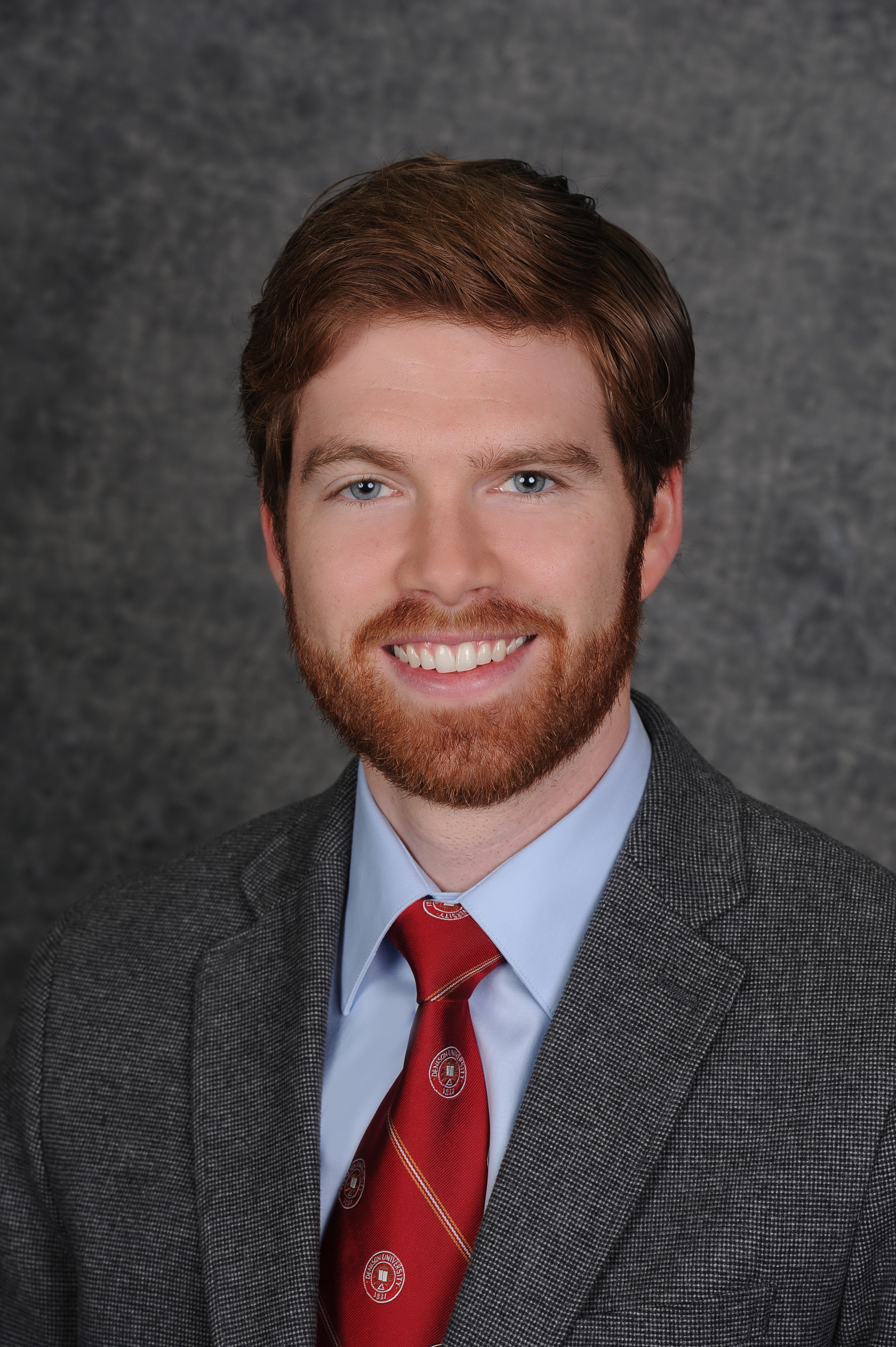
The
first question to ask is does my activity meet the
definition of lobbying? Many states require communications
with an official to include an attempt to influence official
action. Others, like Florida, include attempts to gain the
goodwill of an official, even if no specific piece of
legislation or executive action is discussed. Additionally,
some states, such as Nebraska, limit the definition of
lobbying to promoting or opposing legislation. Discussions
with executive officials, therefore, are not considered
lobbying and registration would not be required. Nebraska
does, however, include the practice of promoting or opposing
executive approval of legislation.
Next,
consider if your contacts with officials surpasses a time,
salary, or expenditure threshold...
Read the full article here
Additional information regarding lobbyist
registration thresholds can be found in the U.S. Lobbying
Compliance Laws section of the State & Federal
Communications website, under Definitions and Registration.
Kevin
L. Newman, Esq., Compliance Associate
Click here to read ALL Ask the Experts
articles in full
Please fill out the small form to
gain access to all articles free!
Thanks.
Click here for subscription information
|
|
|
|
|
|

State and Federal
Communications, Inc.
Scrapbook -
September 2018
|
|
 |
 |
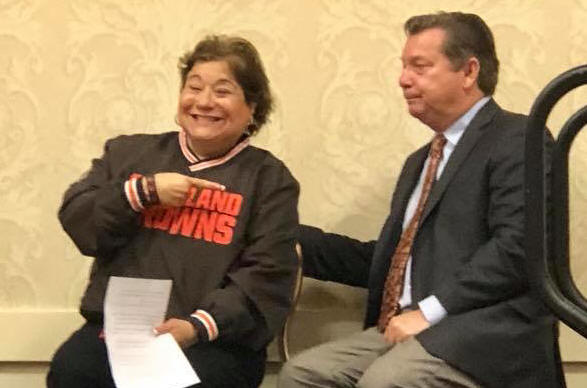
WKYC’s
Jim Donovan with Elizabeth Z Bartz at the Akron
Roundtable.
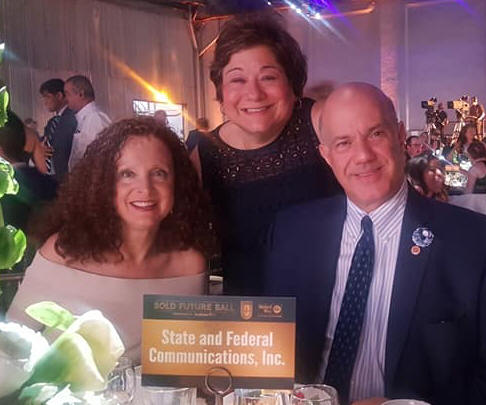
The United Way of
Summit County Bold Ball celebrating its 100th
Anniversary. Nola R. Werren, Esq.,
Elizabeth Z. Bartz, and John P. Chames.
|

Elizabeth Bartz found a lone
Honda at the
2018 NCSL Legislative Summit
… Alas, it had no battery in it.
|
|
|
|

Plan to say hello at future
events where State and Federal
Communications, Inc.
will be attending and/or
speaking regarding compliance issues. |
|
|
COMPLIANCE
NOW is published for our customers and friends.
Click here
to
SUBSCRIBE
or
click
here to UNSUBSCRIBE.
Click here to send us comments regarding
the COMPLIANCE NOW e-newsletter.
State and
Federal Communications, Inc. | Courtyard Square | 80 South
Summit St., Suite 100 | Akron, OH 44308 |
| 330-761-9960 |
330-761-9965-fax | 888-4-LAW-NOW|
http://www.stateandfed.com/

|
 |
The Mission of State
and Federal Communications is
to make sure that your
organization can say, "I Comply."
We are the leading
authority and exclusive information source on
legislation and regulations surrounding campaign finance
and political contributions; state, federal, and
municipal lobbying; and procurement lobbying.
Contact us to learn how
conveniently our services will allow you to say "I
Comply" for your compliance activities.
http://www.stateandfed.com |
www.stateandfed.com |
|